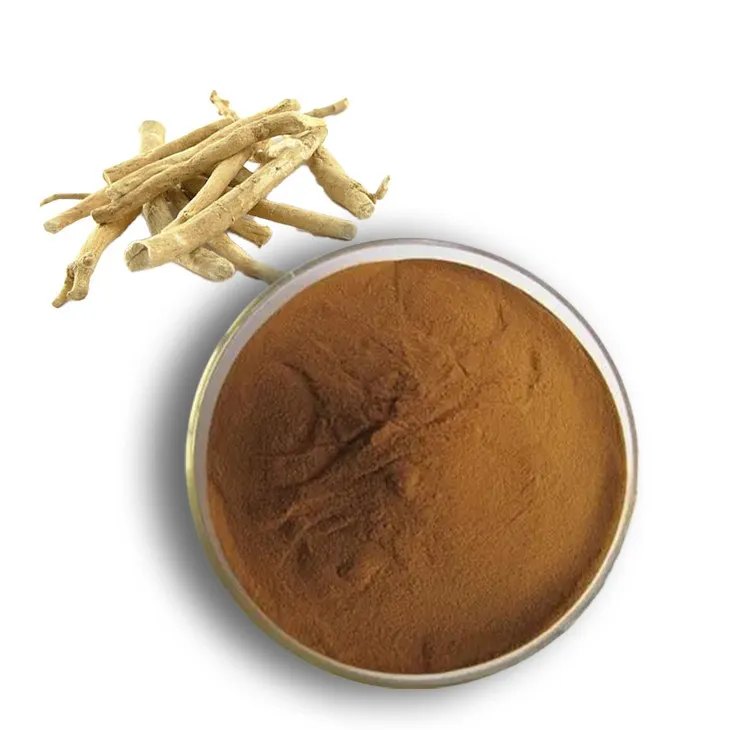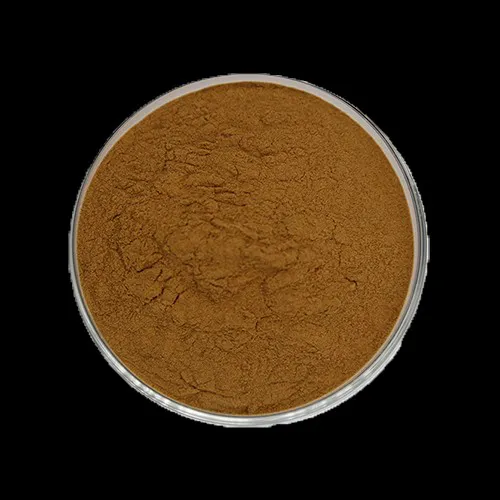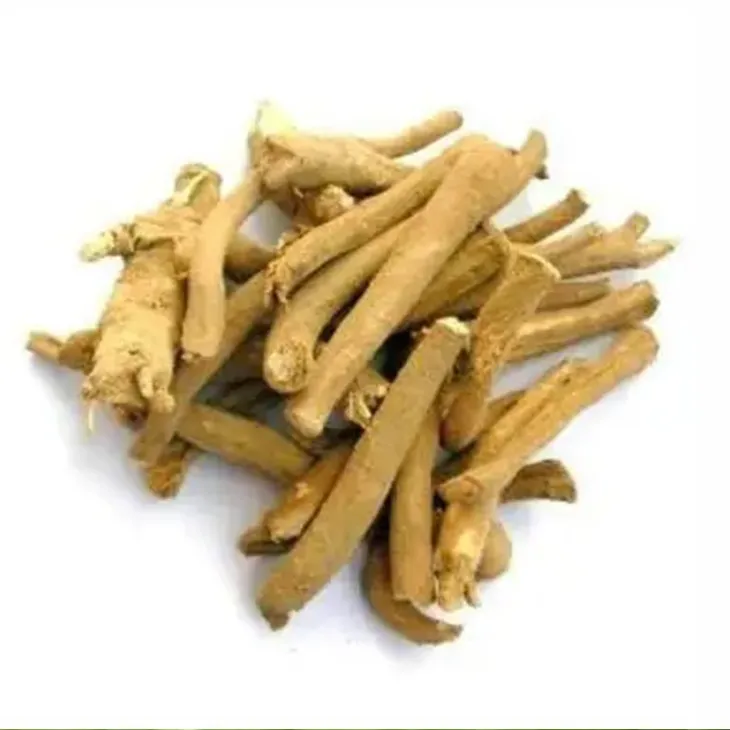- 0086-571-85302990
- sales@greenskybio.com
The Best Herb for Treating Anxiety and Insomnia: Withania Somnifera Extract.
2024-11-12

Introduction
Anxiety and insomnia are two of the most prevalent health issues in modern society. They can have a significant impact on an individual's quality of life, productivity, and overall well - being. While there are various pharmaceutical treatments available, many people are seeking natural alternatives. One such alternative that has gained significant attention in recent years is Withania Somnifera extract, also known as Ashwagandha.
Ashwagandha has a long history of use in traditional medicine systems, particularly in Ayurveda, an ancient Indian system of medicine. It has been used for a wide range of ailments, including those related to stress, anxiety, and sleep disorders. The growing interest in this herb is due to its potential to offer a natural and holistic approach to treating these common problems.

What is Withania Somnifera?
Withania Somnifera is a small shrub native to India, the Middle East, and parts of Africa. It belongs to the Solanaceae family. The plant has several parts that are used medicinally, but the roots are the most commonly utilized.
Ashwagandha contains a variety of bioactive compounds that are responsible for its therapeutic effects. These include alkaloids, steroidal lactones, and withanolides. Withanolides, in particular, are a group of steroidal lactones that are unique to Withania Somnifera and are thought to play a major role in its medicinal properties.

How Ashwagandha Helps with Anxiety
The Body's Stress Response
One of the main ways Ashwagandha helps with anxiety is by modulating the body's stress response. When the body is under stress, the hypothalamic - pituitary - adrenal (HPA) axis is activated. This leads to the release of stress hormones such as cortisol.
Chronic stress can cause dysregulation of the HPA axis, resulting in elevated cortisol levels even when there is no immediate stressor. This can contribute to symptoms of anxiety. Ashwagandha has been shown to help regulate the HPA axis, reducing the over - production of cortisol.
- Studies have found that Ashwagandha can decrease cortisol levels in stressed individuals.
- By normalizing cortisol levels, it can help reduce the physiological symptoms associated with anxiety, such as a racing heart, sweating, and restlessness.
Neurotransmitter Regulation
Ashwagandha also affects neurotransmitters in the brain that are involved in mood regulation.
- It has been shown to increase the levels of gamma - aminobutyric acid (GABA) in the brain. GABA is an inhibitory neurotransmitter that helps calm the nervous system. Low levels of GABA have been associated with anxiety disorders.
- Additionally, Ashwagandha may also have an impact on serotonin levels. Serotonin is another important neurotransmitter that plays a role in mood, sleep, and appetite. By influencing these neurotransmitters, Ashwagandha can help improve mood and reduce anxiety.

Ashwagandha and Sleep Quality
Relaxation of the Nervous System
For those suffering from insomnia, Ashwagandha can be beneficial in promoting better sleep. One of the reasons is its ability to relax the nervous system.
- As mentioned earlier, its effect on GABA levels helps calm the brain, making it easier to fall asleep.
- It also helps reduce muscle tension, which can be a contributing factor to sleep problems. Relaxed muscles are more conducive to a restful sleep state.
Stress - Induced Insomnia
Since Ashwagandha can effectively manage stress, it can also address stress - induced insomnia.
- When stress is reduced, the mind is less likely to be preoccupied with worry and racing thoughts at bedtime, allowing for a more peaceful transition into sleep.
- By normalizing the body's stress response, Ashwagandha can help re - establish a healthy sleep - wake cycle that may have been disrupted by stress.

Clinical Studies on Ashwagandha for Anxiety and Insomnia
There have been numerous clinical studies investigating the effectiveness of Ashwagandha in treating anxiety and insomnia.
Anxiety - Related Studies
- One study involved a group of participants with generalized anxiety disorder (GAD). After taking Ashwagandha extract for a certain period, the participants showed a significant reduction in anxiety symptoms compared to the control group.
- Another study looked at the effects of Ashwagandha on stress - related anxiety in healthy individuals. The results indicated that the herb was able to reduce self - reported anxiety levels and improve overall well - being.
Insomnia - Related Studies
- In a study on individuals with insomnia, those who took Ashwagandha extract reported improved sleep quality, including shorter time to fall asleep, longer total sleep time, and fewer awakenings during the night.
- A double - blind, placebo - controlled study also found that Ashwagandha was effective in improving sleep parameters in people with mild to moderate insomnia.
How to Use Ashwagandha Extract
Ashwagandha extract is available in various forms, including capsules, powders, and tinctures.
Capsules
- Capsules are a convenient way to take Ashwagandha. They usually come in standardized doses, making it easy to control the amount of the herb you are consuming.
- It is important to follow the recommended dosage instructions on the product label. Typically, the dosage may range from 300 - 600 mg per day for general health benefits, but higher doses may be required for treating specific conditions such as anxiety or insomnia. However, it is always advisable to consult a healthcare provider before starting a new supplement regimen.
Powders
- Ashwagandha powder can be mixed with water, juice, or other beverages. It can also be added to smoothies for a more palatable way of consumption.
- When using the powder form, it is crucial to measure the correct amount. A common starting dose for powders is around 1 - 2 grams per day, but again, individual needs may vary.
Tinctures
- Tinctures are liquid extracts of Ashwagandha. They are typically taken by adding a few drops to a small amount of water.
- The dosage of tinctures can be more difficult to standardize compared to capsules or powders. It is usually recommended to start with a small dose and gradually increase it while monitoring for any adverse effects.
Precautions and Side Effects
While Ashwagandha is generally considered safe for most people, there are some precautions to be aware of.
Pregnancy and Breastfeeding
- There is limited research on the safety of Ashwagandha during pregnancy and breastfeeding. It is generally recommended that pregnant and breastfeeding women avoid using Ashwagandha supplements until more is known about its potential effects on the fetus or nursing infant.
Interactions with Medications
- Ashwagandha may interact with certain medications. For example, it may potentiate the effects of sedatives and anti - anxiety medications. Therefore, if you are taking any prescription medications, it is essential to consult your doctor before starting Ashwagandha supplementation.
Side Effects
- Some people may experience mild side effects such as stomach upset, diarrhea, or nausea when taking Ashwagandha. These side effects are usually rare and tend to be mild and transient.
Conclusion
In conclusion, Ashwagandha extract shows great promise as a natural remedy for anxiety and insomnia. Its ability
to regulate the body's stress response, influence neurotransmitters, and promote relaxation makes it a
potentially valuable addition to the treatment options for these common health problems. However, it is
important to remember that while the evidence is encouraging, more research is still needed, especially in
relation to long - term use and its safety in certain populations.
For those interested in trying Ashwagandha, it is advisable to consult with a healthcare provider first,
especially if you have any underlying health conditions or are taking medications. With proper use and under
the right guidance, Ashwagandha may offer a natural and effective way to improve mental well - being and sleep
quality for many individuals.
FAQ:
What is Ashwagandha?
Ashwagandha, also known as Withania somnifera, is a herb that has been used in traditional medicine for a long time. It contains a variety of bioactive compounds which are beneficial for human health.
How does Ashwagandha extract help in treating anxiety?
The bioactive compounds in Ashwagandha extract can regulate the body's stress response. By doing so, it helps to reduce the levels of anxiety. It may interact with the body's hormonal and nervous systems in a way that calms the mind and eases feelings of stress and worry.
Can Ashwagandha extract really improve sleep quality?
Yes, it can. Ashwagandha extract promotes better sleep quality. It helps to relax the body and mind, which is essential for a good night's sleep. By reducing anxiety and stress, it also removes some of the main obstacles that prevent people from getting proper sleep.
Are there any side effects of using Ashwagandha extract?
When used properly, Ashwagandha extract is generally considered safe for most people. However, some people may experience mild side effects such as stomach upset, diarrhea, or nausea. In rare cases, it may also interact with certain medications, so it is important to consult a healthcare provider before using it, especially if you are taking other drugs.
How should Ashwagandha extract be taken for treating anxiety and insomnia?
The method of taking Ashwagandha extract can vary. It can be taken in the form of capsules, tablets, or as a tincture. The recommended dosage usually depends on factors such as age, health condition, and the severity of the problem. It is best to follow the instructions provided on the product label or consult a healthcare professional for personalized advice.
Related literature
- The Effects of Ashwagandha (Withania somnifera) on Stress and Anxiety: A Systematic Review"
- "Ashwagandha for Sleep: A Review of Its Sleep - Promoting Properties"
- ▶ Hesperidin
- ▶ citrus bioflavonoids
- ▶ plant extract
- ▶ lycopene
- ▶ Diosmin
- ▶ Grape seed extract
- ▶ Sea buckthorn Juice Powder
- ▶ Beetroot powder
- ▶ Hops Extract
- ▶ Artichoke Extract
- ▶ Reishi mushroom extract
- ▶ Astaxanthin
- ▶ Green Tea Extract
- ▶ Curcumin Extract
- ▶ Horse Chestnut Extract
- ▶ Other Problems
- ▶ Boswellia Serrata Extract
- ▶ Resveratrol Extract
- ▶ Marigold Extract
- ▶ Grape Leaf Extract
- ▶ blog3
- ▶ blog4
- ▶ blog5
-
Organic Tongkat Ali extract powder factory.
2024-11-12
-
How to make powder with ashwagandha extract.
2024-11-12
-
Rosehip extract manufacturers from China.
2024-11-12
-
The best cat's claw extract in nature.
2024-11-12
-
Chinese Dandelion Leaf Extract Suppliers.
2024-11-12
-
Red Wine Extract
2024-11-12
-
Diosmin
2024-11-12
-
Red Date Extract
2024-11-12
-
Coconut Water Powder
2024-11-12
-
Eucommia Ulmoides Extract
2024-11-12
-
Chaste Berry Extract
2024-11-12
-
Black Garlic Extract
2024-11-12
-
Mulberry Extract
2024-11-12
-
Giant Knotweed Extract
2024-11-12
-
Nettle Root Extract
2024-11-12





















